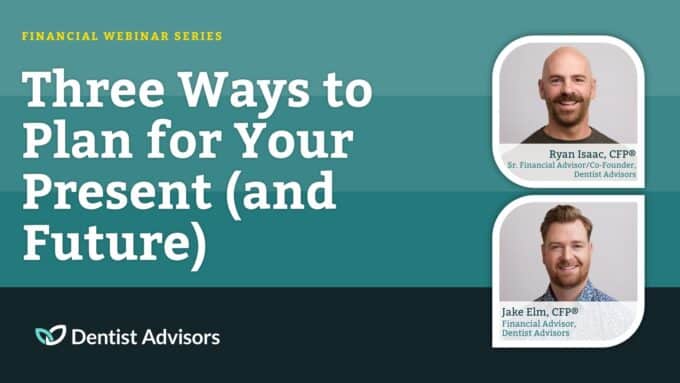To stay on a straight path to retirement avoid making these 7 financial mistakes, which cause many dentists to falter.
Dentists are entrepreneurs, whether they like it or not. As a fellow entrepreneur, I understand some of the pain you’re going through. While I’m not working in someone’s mouth, I’m equally as busy working through someone’s financial affairs.
With entrepreneurship comes significant headwinds. I wake up each morning with a boatload of tasks to complete, vendors to go to lunch with, and employees to collaborate with on various projects. Everyone needs my time, and they need it now.
If you’re like me, you can barely keep up with the demands of your practice, let alone find time to work on your personal finances. You know retirement planning is important, but it’s hard to find the time to focus on it. Additionally, it’s difficult to find someone you can trust.
Unfortunately, time passes, and it passes quickly. Before you know it, an entire year has flown by, and you haven’t saved a dime for retirement. Retirement planning often feels like a second job, and it’s just not high enough on the day-to-day priority list.
Here are 7 mistakes that cause many dentists to stumble on their journey to retirement. If you can avoid these mistakes, you’ll also avoid a delayed retirement.
1. Not tracking what you spend
Like exercise or eating habits, spending habits are often at the top of New Year’s resolution lists. The truth is, any habit formed over time is difficult to change; however, most people don’t realize you don’t have to spend copious amounts of time or have elaborate budgeting techniques to get your spending under control. You do, however, need to keep constant tabs on your spending habits to hold yourself accountable.
Tracking what you spend is very important when you earn more income since your spending tends to inflate with your income. The more you earn, the more you tend to spend, unless you’re keeping yourself accountable to a reasonable limit. By using an app that allows you to track your spending, you can see exactly how much money you’ve spent, not just a ballpark figure in the back of your mind. When you see exactly how much you’re spending and where you’re spending it, you can easily make positive adjustments.
More importantly, you should be calculating the percentage of your total income spent each month. Is this percentage 25% or 50%? Is this percentage growing or declining month to month? If you want to know when you can retire, you’ve got to know what you spend.
One of the simplest ways to keep things in check is to not live out of the practice checking account. Deposit one sum of money into your personal checking account each month. If you run out of money, you’ll know you’re spending more than your budget. Over time, you’ll get better and just saying “no” until next month’s deposit.
Calvin Coolidge, 30th President of the United States, said it best: “There is no dignity quite so impressive, and no one independence quite so important, as living within your means.”
2. Eliminating debt too quickly

There are many factors to consider when paying off debt the right way. Not only does it require patience, but a regular analysis of your personal tax rate, interest rates, age, prepayment penalties, and retirement goals. While the goal is still to be out of debt by retirement, don’t let that goal stop you from investing money until too late in your career.
“What can be added to the happiness of a man who is in health, out of debt, and has a clear conscience?” – Adam Smith (1723 – 1790) , Father of Modern Economics, Author – The Wealth of Nations
3. No automated savings or investment program
Would you believe me if I said it was possible to become a millionaire just by adding a few simple things to what you’re already doing? It starts by saving 10% of your annual income. First, take 10% of your annual income and divide it by 12. Next, using an online account or trusted financial advisor, start making monthly installments into an investment account.
The key is to do this every single month, and only use the money for retirement. If these savings installments are coming via automated withdrawal from an account with the highest cash balance, like your business checking account, it will be easier to be consistent with these payments.
This automated savings program is not only convenient, but its high success rate is statistically proven. I have seen this tactic produce more millionaires than any other system set up to help accumulate wealth.
4. Too many insurance premiums

I’m not saying you shouldn’t carry insurance; nothing can replace the peace of mind and protection the insurance plan I have gives to my family. But, like all good salesmen, insurance salesmen are persistent. And, as a consequence, many dentists are purchasing insurance plans before analyzing how much they actually need. If you’re not careful, you may eventually put large amounts of money towards more insurance than necessary. As you accumulate wealth and start to save, you can also afford to reduce various types of insurance.
5. Unnecessarily high practice overhead
Remember your first hire? Do you remember how much you paid that person? I bet you do. Entrepreneurs usually remember the first time they made the commitment to carry someone on payroll. It’s a big stress, and something they rarely forget.
As time passes and collections increase, so does your overhead. It increases slowly, almost imperceptibly, and before you know it, you’re carrying tens or even hundreds of thousands of dollars in payroll within a short period of time. You used to remember the small increases in payroll, marketing, supplies, and technology expenses, but now it’s just streaming from your business account while you’re focused on growing collections.
Take a look at all your expenses, even the little stuff. Divide each expense by your gross collections (deposits, sales, revenue) to get the percentage each item accounts for in your practice. Over time, notice how things change and how categories may oscillate. Upon doing this (even just once), you’ll ask yourself why you waited so long to go through your bank statements or Quickbooks to find expenses that have crept in over time and can be reduced.
If you don’t actively cut your overhead, it will reduce your ability to retire securely. You’ll have to make some hard decisions, but these tough decisions will protect your income, family, and chances of achieving financial security.
6. Large losses in speculative investments

While some dentists may have the knowledge to self-direct their investments, the majority of dentists DO NOT. And the cost of hiring a competent professional just isn’t as expensive as it used to be. As a general rule, DON’T make investment decisions without consulting an independent advisor. Pay this person for their time, and get an independent perspective on any investment you are considering. Making investment decisions on your own could result in becoming too emotionally attached to one particular deal.
Far too often, I see dentists become slaves to their careers because they made investment decisions with significant risks as soon as they had accumulated a meaningful amount of cash. Such decisions are often made without first seeking advice.
Some dentists invest in companies or large real estate projects managed by friends or family (private placements). I strongly discourage this practice for most people. Dentists will generally be better off saving meaningful amounts of cash (3-6 months worth of overhead), then creating a personal emergency fund (at least 6 months worth of income) using conservative mutual funds. Next, dentists should strive to accumulate 20-30 years of liquid investments using a broad, globally diversified portfolio of publicly traded investments (various stocks, bonds, and mutual funds).
While these investments do not always provide the highest possible return, they do provide a significant degree of liquidity (in case you run into trouble), and they are lower risk. Don’t forget, you’ve already taken a lot of risk to get to this point (dental school, business ownership), and you’ve carried a lot of debt; don’t put everything in jeopardy, especially when you’re likely to retire earlier by simply avoiding major mistakes.
For most dentists, losing $100,000 in a bad investment is the equivalent of adding several extra years to their career. Don’t take unnecessary risks, and be very cautious with any investment you make.
7. No written goals or written retirement plan
Establishing concrete financial goals is critical to a successful retirement. Here are some good examples:
• I want to have the option to stop working at age 62
• I want to have my home paid off by age 60
• I want to have a retirement income of $100,000 per year
• I want to leave at least $25,000 to each of my children
Written goals and deadlines are what ultimately drive us forward. Think back to your Dental Admissions Test: could you have passed if you never scheduled a date to take the test? Or what about your first employee? If you didn’t set a reasonable salary for your first hire, would you have been able to attract him or her?
Good financial planning is about setting specific financial goals. Don’t worry; your goals don’t have to be perfect. Goals can simply be starting points, but you have to set them or you’ll waffle around for years in what I call “subjectiville.” People who live there talk like this:
“I don’t know Hank, we’re gonna have to see how things go.”
“It depends…”
“I dunno. Lots could change.”
“Can’t predict the future, ya know?”
Maximize the opportunity you’ve already created through hard work and specialization. Hiring the right financial advisor will increase your wealth, provide accountability, and protect you from making mistakes and doing things you don’t understand well enough to do on your own.




